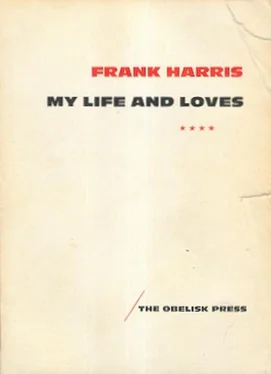Frank Harris - My Life And Loves, vol 5
Здесь есть возможность читать онлайн «Frank Harris - My Life And Loves, vol 5» весь текст электронной книги совершенно бесплатно (целиком полную версию без сокращений). В некоторых случаях можно слушать аудио, скачать через торрент в формате fb2 и присутствует краткое содержание. Жанр: Эротика, Секс, на английском языке. Описание произведения, (предисловие) а так же отзывы посетителей доступны на портале библиотеки ЛибКат.
- Название:My Life And Loves, vol 5
- Автор:
- Жанр:
- Год:неизвестен
- ISBN:нет данных
- Рейтинг книги:3 / 5. Голосов: 1
-
Избранное:Добавить в избранное
- Отзывы:
-
Ваша оценка:
- 60
- 1
- 2
- 3
- 4
- 5
My Life And Loves, vol 5: краткое содержание, описание и аннотация
Предлагаем к чтению аннотацию, описание, краткое содержание или предисловие (зависит от того, что написал сам автор книги «My Life And Loves, vol 5»). Если вы не нашли необходимую информацию о книге — напишите в комментариях, мы постараемся отыскать её.
My Life And Loves, vol 5 — читать онлайн бесплатно полную книгу (весь текст) целиком
Ниже представлен текст книги, разбитый по страницам. Система сохранения места последней прочитанной страницы, позволяет с удобством читать онлайн бесплатно книгу «My Life And Loves, vol 5», без необходимости каждый раз заново искать на чём Вы остановились. Поставьте закладку, и сможете в любой момент перейти на страницу, на которой закончили чтение.
Интервал:
Закладка:
I answered: “I have no wish to vote; I only want to remain quietly here.”
But he said: “You had better make yourself a citizen, if you can.”
That seemed to me significant. Accordingly I took all the necessary steps and was again accepted as an American citizen in 1919. This put an end to the petty annoyances of Wilson's government and A. S. Burleson.
One word more to show the idiocy of war. Considerable commotion was stirred up in 1905 by the publication of Sir W. Butler's report on the clever scheme by which, after the South African war was over, millions of pounds worth of supplies were sold by the British government to contractors at a low price and immediately bought back by the government from the same contractors at a very high price. As there was no need to sell it at allthis transaction represented an ingenious contrivance to put a great deal of money into somebody's pocket at the expense of the British taxpayer. The hopeless state of confusion into which the Ministers had allowed everything to slide in South Africa is shown by the fact that they were quite unable to say what had been lost by sheer dishonesty or whether, as Mr. Balfour wished to make out, England had actually made money on the transactions. Jingo finance is a mere affair of blind man's bluff. The War Office at first objected to selling the stores by contract, then gave way. It first demanded monthly returns of sales, and then allowed month after month to pass without any returns being made. Meanwhile, contractors got rich. Ministers obstinately turned a deaf ear to the warnings of the Liberal leader, and instead of exposing the scandal, did all they could to hush it up. Fortunately the Auditor-General, an official independent of the executive, brought the matter before the Accounts Committee. By this means General Butler's report came to be published. Otherwise everything would have been hushed up “in the best interest of the Army.”
I hate accusing my adopted nation of crimes, but now and then it is an imperative duty, an obligation of conscience. These accusations shame me to the soul.
In 1910 Secretary of War Baker promised to punish the officers who were found guilty of brutalities to soldiers in prison camps in France. “It is not too late,” he declared, “to punish any officer or enlisted man still in the service.”
It was not too late to punish, but it was certainly too late to prevent the atrocious cruelties that stained the name of America and which it was Secretary Baker's obvious duty to prevent at all costs.
For over two years he had been listening to the court-martial reports, confirming or mitigating, and revising them. He ought to have learned his work. “There have been three hundred and fifty thousand condemnations by court-martials in these United States.” I am quoting the daily papers. Dozens of soldiers and conscientious objectors were sentenced to ten and twenty years' imprisonment for offenses that nowhere else in the civilized world would have been punished with more than one or two years. Secretary Baker sympathized with medieval cruelty or he'd have revised these atrocious sentences. Dozens of men were tortured till they went mad in prison, or committed suicide, or died in agony, while Secretary Baker continued eating, drinking and talking platitudes, all the while callously neglecting his chief duty. He allowed these myriad crimes and devilish atrocities to be perpetrated without doing anything to prevent them.
The story of the martyrdom of the three Hofer brothers, who belonged to the religious sect of the Mennonites, will always in my mind be associated with Mr. Secretary Baker.
These men were objectors to war services on religious grounds. Though married, they were taken from their home in South Dakota to Camp Lewis. On the way they were treated worse than dogs. Their beards were clipped to make them ridiculous, and they were cursed by the various guards just to show them what our brand of Christianity means. After two months in close confinement they were court-martialed and sentenced to thirty-seven years' imprisonment! This, however was reduced by the base commander to twenty years.
They were sent to Alcatraz prison in San Francisco Bay fettered at the ankles and wrists. Here they were put in solitary dungeons below ground in darkness, filth and stench. For four and-a-half days they received no food. They had to sleep on the wet concrete floor without a blanket. During the next day and-a-half, they were manacled by the wrists to the bars of their cell, so high that they could hardly touch the floor with their feet. David, the one discharged man now at home, says he still feels the effects in his sides.
When they were taken out of the “hole” at the end of the week, they were covered with scurvy eruptions, insect-bitten, and with arms so swollen that they could not get the sleeves of their jackets on.
They had been beaten with clubs in the dungeons by their guards so unmercifully that when taken out, Michael fell down unconscious. Did Secretary Baker approve of this? If he didn't, he ought to have taken care that the brutality was never repeated.
The torturing at Alcatraz prison lasted for four months. Then they were transferred to Fort Leavenworth, chained two and two. The journey lasted four days and nights.
At Leavenworth they were driven through the streets and prodded with bayonets as if they were swine. They were manacled nine hours a day and given only a bread and water diet. Two of the brothers, Joseph and Michael, died under the torturing.
Is there any doubt as to who was the better man, the brothers Hofer who went through martyrdom to death for their noble belief, or Secretary Baker who was responsible for their murder?
After the facts had been brought before the Secretary of State again and again, month after month, day after day, at long last, on December 6, 1918, nearly a month after the war was ended, Secretary Baker found time to issue an order prohibiting cruel corporal punishment, and the handcuffing of prisoners to the bars of their dungeons, etc. Secretary Baker already knew such torture was being practiced, knew too, that it was illegal.
Five days later, however, Jacob Wipf, who had been confined with the Hofer brothers, was still handcuffed to the bars of his cell for nine hours a day. A monster petition for the release of conscientious objectors was laid before the Secretary of War and further relief was given to the tortured prisoners.
On January 27, 1919, 113 conscientious objectors were discharged from the barracks at Fort Leavenworth in pursuance of an order of Secretary Baker dated December 2. Even then, Jacob Wipf was not released. He was only set free on April 13, 1919.
Senator Norris, of Nebraska, who had been a judge before he became Senator, said: “The Mennonites are the best people on earth. I have never seen one of them in court. If everybody were as good as they, there would be no need of courts and prisons.”
Over two thousand conscientious objectors were sentenced in England to various terms of imprisonment. In no case, I believe, was a longer sentence given than two years. In no single case was torturing such as took place in our prisons even alleged. No British officers jabbed defenseless men with bayonets, or beat them with clubs, or kicked them, or killed them.
When a woman is accused before a London magistrate of soliciting men, or being a prostitute, and manages to clear herself of the charge, the magistrate always accords a sum of money from the poor-box to atone for the wrong done her.
This practice of compensation is a principle of English justice. For instance, a suffragette was sent to prison in Brixton in 1913. She slipped when in prison and broke her ankle. The prison doctor saw her and said it was nothing; she should go on walking. Her month ran out and she was discharged. A competent London doctor examined her and found that her anklebone had been broken; through not having been reset, one leg was permanently shorter than the other. The matter was brought to the notice of the Home Secretary, who happened to be Mr. Winston Churchill. He naturally exonerated the doctor from all blame, but accorded to the woman 500 pounds for the injury she had sustained.
Читать дальшеИнтервал:
Закладка:
Похожие книги на «My Life And Loves, vol 5»
Представляем Вашему вниманию похожие книги на «My Life And Loves, vol 5» списком для выбора. Мы отобрали схожую по названию и смыслу литературу в надежде предоставить читателям больше вариантов отыскать новые, интересные, ещё непрочитанные произведения.
Обсуждение, отзывы о книге «My Life And Loves, vol 5» и просто собственные мнения читателей. Оставьте ваши комментарии, напишите, что Вы думаете о произведении, его смысле или главных героях. Укажите что конкретно понравилось, а что нет, и почему Вы так считаете.






![William Frith - John Leech, His Life and Work. Vol. 1 [of 2]](/books/747171/william-frith-john-leech-his-life-and-work-vol-thumb.webp)
![William Frith - John Leech, His Life and Work, Vol. 2 [of 2]](/books/748201/william-frith-john-leech-his-life-and-work-vol-thumb.webp)




